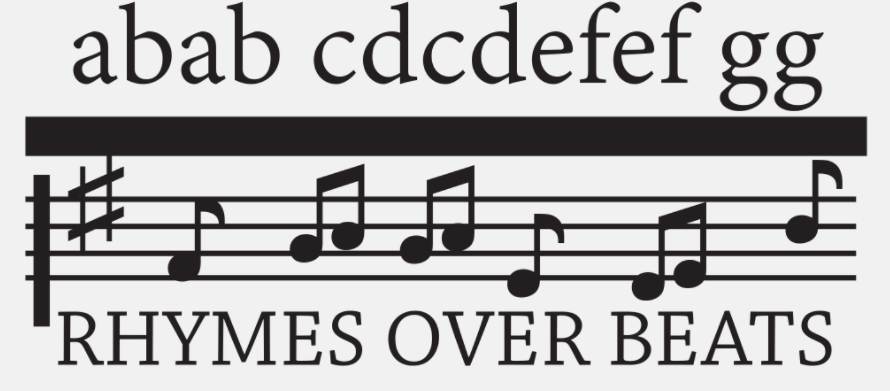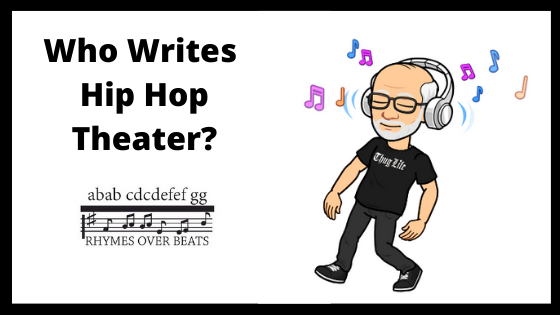
by Patrick Blake | Jan 26, 2022 | Blog
Elements of Hip Hop Theater Part 3
What makes a work of theater a work of hip hop theater is the question we have been considering in the last two blogs, based on a proposed definition. Last week’s blog asked if a hip hop work must include all elements of hip hop hop, and if it does, is that sufficient?
This week’s blog looks at who gets to make hip hop theater.
Can anyone create Hip Hop theatre, or must the creative people involved belong to the culture that gave rise to hip hop?
In short, is it a work by black people for black people only?
Who Gets to Create Hip Hop Theater?
A work of theater is one of the most collaborative art forms. It requires participation by individuals over and above the creatives.. For example, a sound technician who makes sure an actor can be heard is not a creative but is essential to the overall effect.
So are the producers and investors make the show happen.
Does everyone involved have to be black?
I was thinking about the musical, IN DAHOMEY. It was the first Broadway show written by blacks with an all black cast. Is it a hip hop theater piece?
We would welcome your thoughts.
Next week’s blog will attempt to give our answer to the question.
Our book suggestion for this blog is Black Theatre, Ritual Performance in the African Diaspora edited by Paul Carter Harrison, Victor Leo Walker II, and Gus Edwards.
.
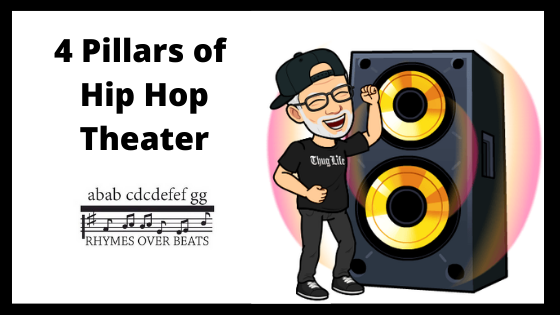
by Patrick Blake | Jan 21, 2022 | Blog
Definition
Last week’s blog offered a two part definition of hip hop theater. This weeks blog is a discussion of the first part of that definition.
A work of hip hop theater rests on the four pillars of hip hop. They are:
- MC
- DJ.
- Graffiti
- Breakdancing
This can be agreed to by everyone. But what does it mean in practice?
Creating Hip Hop Theatre
Specifically, must every individual work of hip hop theater include each of these elements?
If the work is a musical, it is easy to see how the MC and DJ are included. Even breakdancing is not that much of a stretch.
But what about graffiti? And even if all elements are included, must other elements [of hip hop theater] also be included?
For example, when rock became a dominating musical genre, movie people rushed to include rock in their regular movie storytelling of “boy meets girl, boy loses girl, boy gets girl back” movies. Movies stayed the same, just with rock music.
What Do You Think?
So I ask you: could Frankie and Annette rap? Should the stories have more depth to them thematically? For example, must a theme of Social Justice always be inserted?
I would really like to know what you think.
And since I mentioned the Persley book last week I want to also recommend another book on hip hop theater: “Say Word,” an anthology by Daniel Banks, is another excellent read.
Let me hear your thoughts by commenting below – even better, send your scripts to patrickrobad@gmail.com.
.
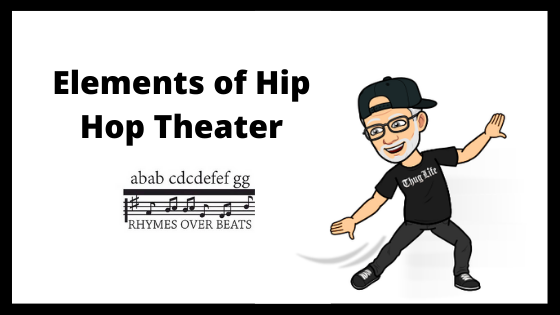
by Patrick Blake | Jan 12, 2022 | Blog
What is Hip hop Theater?
For the first post of the new year I’m revisiting the concept of hip hop theater.
I hope everyone has read Professor Nicole Hodges Persley’s book, “Sampling and Remixing Blackness in Hip Hop Theater and Performance” that I mentioned last month. I was reminded of it when I recently watched a video clip from a musical we’ve just become involved in. The musical is called Syncing Ink. We are excited to be involved in the production. You will be hearing a lot about it going forward.
The video is directed at an audience that may never have heard about hip hop theater. So, rather than being a video about the play, it talks what hip hop theater is. It makes the point that in order for a work of theatre to be a work of hip hop theater, it must do one of two things:
- Hip hop theater incorporates four elements of hip hop. They are the DJ, the MC, the taggers, the people who create Graffiti, and b-boying, the dancers.
- Second, it argues that Hip hop theater is an artistic expression created by black people for black people.
An Expanded Audience
While I agree that what the video describes is certainly hip hop theater, I’m not sure that only those works of theater that satisfies the video’s criteria are hip hop theatre. In short, it is not exhaustive.
The next two blogs will look at the suggestions the video makes for hip hop theater.
Stay tuned next week!
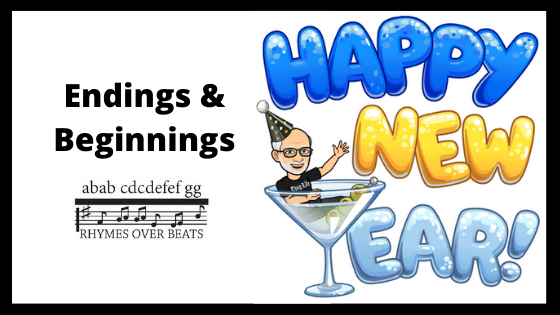
by Patrick Blake | Jan 4, 2022 | Blog
Rhymes Over Beats is on the Move
For the first blog post of the new year I’m going to emulate the Roman god Janus. Janus is the god of gateways and doors. He looks both forward and backward. He is between what was and what is to come.
In 2021 Rhymes Over Beats, even with the brake of COVID, accomplished quite a bit:
- Our presence on social media has grown steadily.
- Work continued on the documentary When Reagan Killed Roosevelt
- We began work on a new documentary, also on the early days of hip hop.
- Company member Masta Ace had the second developmental table reading of his hip hop musical.
- I finished the first draft of a musical of the Irish immigration to America in the 1850s
Going forward in this new year 2022, we hope to:
- have an in person staged reading of Masta Ace’s musical and a table reading of mine.
- announce the release dates for both documentaries
- continue our outreach to the hip hop community to encourage more artists to write hip hop musicals.
Finally, we want to convey our wishes for the new year embodied in an old Irish proverb/blessing: “May the best day of last year be the worst day of this year.”
Happy New Year from Rhymes Over Beats!
via GIPHY
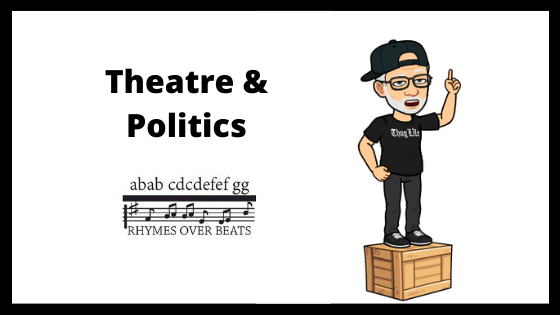
by Patrick Blake | Dec 21, 2021 | Blog
To Post or Not To Post
Last week I went to a political fundraiser. Of course, I had the obligatory photos with the candidate taken and posted them.
I thought long and hard about doing this (not about going, but about showing publicly that I went on social media). It was, after all, not the opening of a friend’s show where people would wonder if I didn’t go. It was political, not theatrical.
Integrity is Key
I worry about discouraging potential audience members by publicly supporting a candidate they might not. I know that I would not be comfortable to be seen to publicly supporting a work whose politics seem to me to be questionable. It seemed that I should keep my politics separate from my theater.
Upon reflection though, I’ve come to realize they are the same thing.
I don’t think it is possible to separate politics from theater. Theater is political. Plato famously banned playwrights (he called them poets) from his utopia. He thought that theater used the power of emotion combined with the power of the intellect to change people’s minds. This made theater dangerous. He thought individuals’ minds should be changed by the power of the intellect alone.
Plato’s approach makes for pretty boring theater.
The theatre Rhymes Over Beats produces is theater that is concerned with social justice.
We do political work. As long as our personal politics match that of the shows we produce, we will have no issues.
Do you agree?
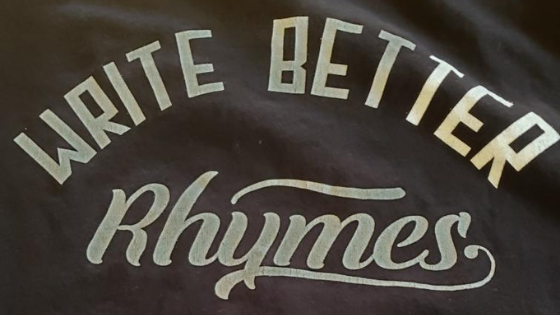
by Patrick Blake | Dec 9, 2021 | Blog
RIP Stephen Sondheim
Because Rhymes Over Beats is a theater company, before another day goes by we must add our voice to the chorus of praise for the life and work of Stephen Sondheim. His passing leaves a void nearly impossible to fill.
And because we are a hip hop theater company, we especially want to praise his use of various rhyme schemes.
Use of Rhyme in Musical Songs
In his work Sondheim has used every possible way of constructing a rhyme. There is one song, however, that I think is exceptional – and strangely enough, it is NOT one from his many theatrical works.
It is “I Never Do Anything Twice,” a song composed for the 1976 film The Seven-Per-Cent Solution. On YouTube there are multiple versions of the song. I would encourage everyone to listen to it.
You’ll find that the song has three verses and one chorus. In the verses he rhymes the end word in every other line. In the chorus, he rhymes the end word three lines in a row. In one chorus he uses the same word as a rhyme with itself, playing with the different meanings of the word (“habit” as an article of clothing and as a repetitive behavior).
This kind of virtuoso writing of rhymes is something we writers should all aspire to do.
Now, sadly, there is one less person to do it.
#RIP Mr. Sondheim.

